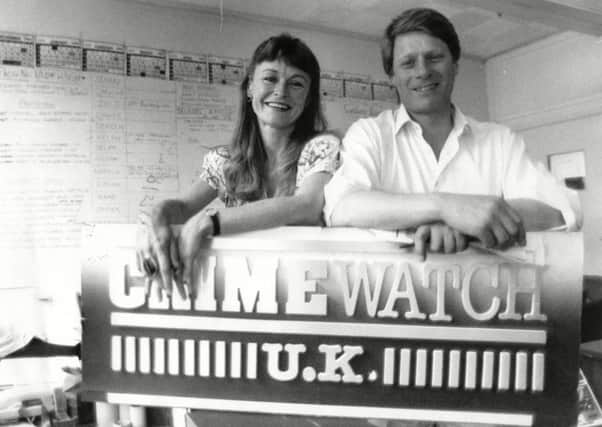Sleep well, Crimewatch, as BBC pulls plug


But after 33 years, the BBC has announced that Crimewatch, one of the longest running shows in its history, has served its time.
The corporation yesterday signalled an end to the prime time programme credited with helping to solve cases such as the murders of toddler James Bulger and eight-year-old Sarah Payne.
Advertisement
Hide AdAt its peak, Crimewatch drew as many as 14 million viewers, but in an age when channel choice has exploded and viewing habits are undergoing a seismic shift, it now attracts an average audience of around three million.
A spokesman for the BBC said that although it was “incredibly proud” of Crimewatch and the “great work” it had achieved over the years, its place in the evening schedules was no longer an ideal fit and it would now make way for “new innovative programmes”.
He said the spin-off daytime strand, Crimewatch Roadshow, would continue, with an increase in the number episodes allowing for two series to be broadcast a year.
However, police and crime campaigners expressed sadness and disappointment at the decision to end the flagship show, which was only relaunched last September, featuring Jeremy Vine and Tina Daheley as hosts.
Among the crimes featured on the programme was the murder of chef Claudia Lawrence, 35, who disappeared on her way to work at the University of York in 2009.
Martin Dales, a friend and spokesman for Miss Lawrence’s father Peter, said: “The number of times we have been involved with Crimewatch, it has always been helpful. It is the exposure that is important.”
Advertisement
Hide AdHe argued the programme fits into the work of a public service broadcaster, adding: “It is disappointing and it strikes me that it is a huge loss in expertise in linking the relevant police forces and the public to a number of channels.”
Sue Cook and Nick Ross hosted the first show in 1984.
It featured the murder of 16-year-old Colette Aram, who disappeared as she walked to her boyfriend’s house in Keyworth, Nottinghamshire, in October 1983.
Advertisement
Hide AdThe launch was fraught with tension and mistrust. Mr Ross said elements of the media were opposed to its concept, believing the programme makers to be “a bunch of coppers’ narks”.
At the same time, he reflected, the police, bar one chief constable, thought the production team were “a bunch of left-wingers.”.
However, the public response to the programme soon dispelled those early doubts.
Ms Cook was replaced by Jill Dando in 1995, with the latter’s murder in 1999 featuring on the programme a month later. As a result of calls from viewers, police pursued a new line of inquiry that resulted in the arrest of Barry George. George was wrongly convicted of the killing and acquitted in 2008. Ms Dando’s killer has never been found.
Other crimes to have featured on the show over the past 33 years have included the murders of Rhys Jones and Damilola Taylor, as well as the disappearances of Madeleine McCann and Suzy Lamplugh.
Andrea MacDonald, chair of the Scottish Police Federation, said: “Crimewatch provided something very different when it was launched and it has become an institution over the past three decades.
Advertisement
Hide Ad“In the world before social media it allowed the police to reach large numbers of the public to ask for assistance. It was undoubtedly instrumental in helping to solve some very high profile crimes.”
Mark Hallas, chief executive of the charity Crimestoppers, said: “Like us, the Crimewatch TV programme helps the public to solve crimes. We worked with them over many years and are sad to hear this news.”
Advertisement
Hide AdHe added that people can contact the charity online or over the phone “to pass on information about crime 100 per cent anonymously”.
Mr Ross, who was part of the programme for 23 years and ended every show with the phrase “don’t have nightmares, do sleep well”, welcomed the decision to end Crimewatch’s run.
The veteran broadcaster said he did not feel “huge emotion” about its demise, explaining: “I’m just astonished it’s lasted this long. It was something that was revolutionary when it began. It ran out of puff a long time ago. They did pretty damn well to keep it going so long.”
Mr Ross also cast doubts over the ability of the Crimewatch Roadshow series to have a major impact due to its transmission time.
He added: “If half the population were watching the programme, you were pretty likely to find somebody. Once you start getting daytime audiences and you’re talking hundreds of thousands, or at most very low millions, your chances are very low.”